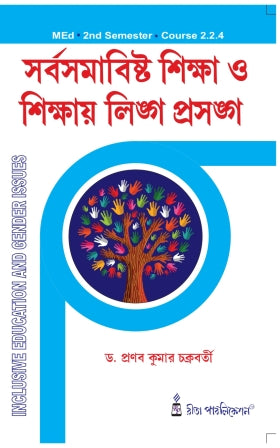Course-2.2.4_Sorbosomabisto Siksha ebong Sikshay Lingo Prasango (MEd_2nd Sem)
Course-2.2.4_Sorbosomabisto Siksha ebong Sikshay Lingo Prasango (MEd_2nd Sem) is backordered and will ship as soon as it is back in stock.
Couldn't load pickup availability
Genuine Products Guarantee
Genuine Products Guarantee
We guarantee 100% genuine products, and if proven otherwise, we will compensate you with 10 times the product's cost.
Delivery and Shipping
Delivery and Shipping
Products are generally ready for dispatch within 1 day and typically reach you in 3 to 5 days.
Author: Dr. Pranab Kumar Chakrabarti
Syllabus:
Unit-I: Inclusive Society: Overview
- What is meant by an inclusive society??
- Elements necessary for creating an inclusive society
- Exclusion and Inclusion in Education: Conceptual overview
- Understanding social inclusion: role of education
Unit-II: Educational Reforms for Inclusive Society
- Building an Inclusive school: desired changes in System, Structure, Practice and
- Culture,
- Education for a multicultural society,
- Principles of teaching and learning in a multicultural society.
- Education for peaceful co-existence
Unit-III: Assessment and Teaching Learning Strategies for the Disabled
- Need and process of early identification and assessment Special, Integrated and Inclusive Education
- Curriculum adjustment and adaptation, Classroom Management, Peer tutoring, assistive devices, Barrier free Environment and Teaching Strategies
- Vocational Training, Employment and Rehabilitation, Individualized Education Programme and Computer Assisted Instruction.
- Use of Information and Communication Technologies, Audio-Visual Aids, Multi-Sensory Approach, Individualized Education Programme, Computer assistive Instruction
Unit-IV: Concept & Historical Perspectives of Gender Issues
- Gender, sex, sexuality, patriarchy, masculinity and feminism.
- Gender bias, gender stereotyping, and empowerment.
- Equity and equality in relation with caste, class, religion, ethnicity regions.
- Historical backdrop: Some landmarks from social reform movements of the nineteenth and twentieth centuries with focus on women?s education.
- Contemporary period: Recommendations of policy initiatives commissions and committees, schemes, programmes and plan.
Unit-V: Gender Identities and Socialisation Practices in
- Family
- Schools
- Other formal and informal organisation.
- Schooling of Girls:
- Inequalities and resistances (issues of access, retention and exclusion.
- Understanding the importance of addressing sexual harassment in family, neighbourhood and other formal and informal institutions.
Unit-VI: Curriculum and Gender Issues
- Curriculum and the gender question
- Construction of gender in curriculum framework since Independence: An analysis
- Gender and the hidden curriculum
- Gender in text and context (textbooks? inter-sectionality with other disciplines, classroom processes, including pedagogy)
- Teacher as an agent of change
- Development of life skill and sexuality





